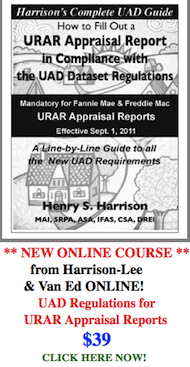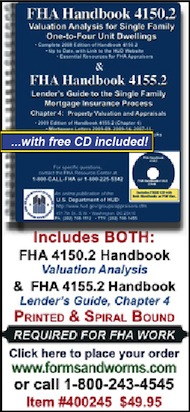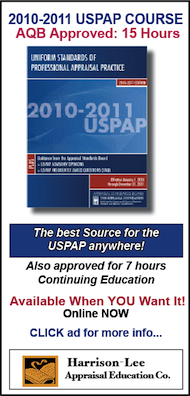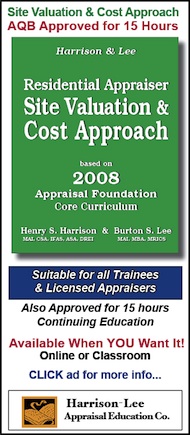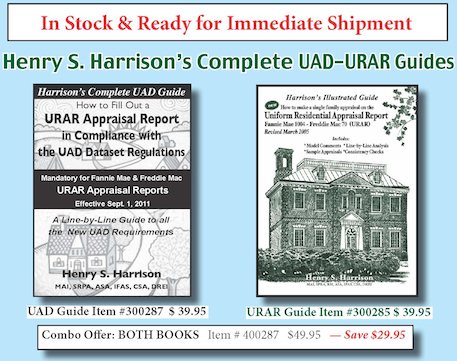Sound Off!
I see some merit to your proposed solution to the housing industry crisis (June 2011 Editorial). I just do not give it much hope. There are too many powerful lobbies that would rather just suck off the taxpayers while they sail to the Hamptons in their newly redecorated yachts.
I am sorry to say that the lessons that should have been learned from the RTC back in the mid-1980s were soon forgotten like a bad dream. The exuberance of lessened oversight allowed a new class of lenders that have brought back the dream as a recurring nightmare. The cost to taxpayers this time is more than money -- it's a fundamental sense of security and faith in our leaders and elected representatives that has been lost.
Regulation and the standardization of the appraisal industry should have been a good thing. New forms (then the MC and now the UAD) were supposedly designed to help. Now, appraisal is being delegated to the lowest common denominator generated by a computer model. May as well call it an AVM and be done with it.
Yes: we as an industry are growing old. There will be no new blood when the pay is less than a mindless position in a fast food or retail associate's job. There is no substitute for experience and honesty -- and experience is damned expensive. Tell me how many less than honest people have been reprimanded or lost their certification? Tell me how many young people can withstand years of substandard pay and costly education to qualify for a tenuous crack at independent self employment? And what is the meaning of "reasonable and customary fees"? All I know is that back in the 1970s, fees were in the $300+ range, there was a rotation at most lenders, and if too many bad valuations surfaced, you got drooped like a hot potato. Maybe there was more time and physical labor involved. Today, the cost of everything from insurance to data sources to software and hardware has skyrocketed. Rates have not changed much, except that the AMCs take a hefty cut. Many appraisers do not want to or will not work for an AMC -- or so they say.
Try to live in this market if you do not have some steady work! I would like to know just what percentage of assignments are not involved with an AMC. Perhaps someone should do a survey!
Joe Johnson
Cert. Residential Appraiser, FL
Sound Off!
Dear H2 and REV:
Why are we not hearing about any law suits over the Customary and Reasonable Fee fiasco? It would seem that the very low fees that are currently being paid are both forcing appraisers out of the profession and helping to create a barrier for new trainees/apprentices from entering the profession. Combined with appraisers either retiring or dying off, the current available appraiser pool is dwindling and will continue to do so in the foreseeable future.
If there are going to be less and less residential appraisers in the coming years, why are those with a stake in having more appraisers being silent?
Won’t E & O Insurance companies feel the pain with fewer and fewer insureds?
Won’t software companies lose huge amounts of new sales and maintenance contracts with less and less appraisers buying their products?
Aren’t the continuing education and new licensee schools going to have to go out of business with no new pupils?
Wouldn’t the large appraisal organizations feel the pinch with not having robust membership?
The lack of anyone with deep pockets and a large stake in the game — maybe even a very large appraisal firm? — challenging the Customary and Reasonable Fees that did not change as they were supposed to on April 1st is mind-boggling. Those entities that depend on sheer numbers of working appraisers to stay in business should at least test the waters with a class action lawsuit. The specter of a $10,000 fine per occurrence and the potential liability for a fine per appraisal should sharpen the mind and cause some lenders or AMC execs to rethink the flawed fee model.
Just a thought!
Fred Hankins
fredhankins@earthlink.net
Sound Off
Dear H2,
I would be glad to respond to the person who complained about over and under appraisals, and seemed to imply that all appraisers are dishonest. Performing residential appraisals daily with anguish and anxiety, trying to find the best comparables to fit the appraisal assignment in a market where more often than not, sales are infrequent or dated at best — I strive to provide the best possible product in a world of increasing competition for less than reasonable fees. My reports incorporate the latest statistical analysis (something we never did back in the old days) and I strive to stay educated and up to date on the latest analytical tools which have made my reports more credible than ever.
In an age, where good appraisers are dying off (like me!) and good new appraisers are becoming harder to find....I can only surmise that the writer, Austin Meredith, has not had the good fortune to run into any of the many good appraisers that still do exist, who do not blow their own horns, but go quietly about their days, still taking pride in their work and striving to produce the best possible product at all times. Happy appraising — honest and professional appraising — in not cookie cutter or boilerplate work!
Aloha!
Donna Gutierrez
Appraisals All Islands
sundara@hawaii.rr.com
Dear Donna,
I can understand your frustration with the current state of affairs in the appraisal profession. There are a lot of under-trained appraisers who turn out poor work, and some dishonest ones too, giving our profession a bad name. A big problem is the market place has many buyers of appraisals who are not interested in quality and integrity. I think things are slowly getting better. Time will tell.
Sound Off!!
Dear Henry:
I am not a real estate professional, but a homeowner. Recently, I witnessed a spasm of over-appraisal of real estate, caused by appraiser eagerness to please the banks during the real estate bubble, followed by what the newspapers have proclaimed as a "correction," in the post-bubble-pop period.
I now have reason to doubt that any such "correction" actually has occurred. A real correction of this spasm of over-appraisal of real estate, would have required the appraiser to transit from dishonesty toward honesty. Instead, in my personal evaluation, based upon what I have personally witnessed, what has occurred is that the appraiser has transited directly from dishonesty-one-way to dishonesty-the-opposite-way. What has happened is that the appraiser, who had been overeager to suck up to the bank by over-appraisal, has become overeager to suck up to the bank by under-appraisal. That's equally dishonest, and not something to be proud of.
It has been proclaimed, in the newspapers, that in order to correct the previous tainted situation, the banks have distanced themselves from the appraisal industry. Now, supposedly, that problem has been coped with, because banks no longer have direct contact with the appraiser who is chosen.
However, in my view, the only thing that has changed is the banks have changed the sort of dishonesty they require now to under-estimate dishonesty. From my perspective, this creates a very negative attitude toward your profession.
Austin Meredith
Durham, NC
kouroo@kouroo.info
Dear Austin,
Appraiser independence is a problem that has plagued the appraisal profession for as long as I can remember.
(I became an appraiser in the 1960s).
The largest national appraisal organization gave appraisers designations in recognition of their education and experience, the MAI -- which soon became called by some "Made As Instructed".
The profession continuously lobbies for legislation that prohibits trying to influence the outcome of an appraisal to stop the problem. In my opinion, based on human nature, the problem is always going to exist. Appraisers are human beings, and their well-being depends upon satisfying their customers.
I don't think they are different from other professionals who also try to satisfy the patients, clients and bosses.
Sound Off!
Dear Henry,
If a floundering submarine has sunk and is now taking on water, why in the "h***" would anyone stay on board? Gee, that sounds like Fannie/Freddie......morally, ethically, financially — and now intellectually — bankrupt. Why would anyone listen to their 'guidelines' and/or the 'new' UAD? I know that I am not writing this as a lone wolf, as over 51% of the appraisers would rather be pursuing some other career at this point. Oh, I almost forgot to mention that Fannie is trading 'OTC' at .39 cents a share! Wow — how the mighty have fallen from a high of around $65.00 a share!! I sure am glad that I told our investment club not to invest in Fannie 6 years ago. I could smell it coming. Apple Computer has done better with a pay-off well in the 5 figures as an investment.
I see Fannie/Freddie as just another failed institution. So: UAD — why, and who cares? Like a loan officer once told me, "You know, Don, the more paper work that is required by Fannie/Freddie, the better the loan..." (Of course, he was kidding!)
Seems the powers that be are determined to take the 'art' out of appraising. That's something to think about.
Donald Lentz
alliedappraisal@epix.net
Dear Donald,
I am sure many appraisers would agree with your desire that Fannie Mae and Freddie Mac disappear. Buying their stock now is like buying a lottery ticket. In my opinion, they may change their names and they may become government agencies again, but they are not going to go away. Freddie and Fannie play a key role in the mortgage market that may be impossible to replace, at least in the short term. I agree that it is unlikely the UAD will make much difference in the quality of appraisals. This is not its primary purpose, which is to standardize the way appraisals are electronically transmitted. However, after studying the UAD for over three months in preparation for writing the UAD/URAR guide, I don't think there is anything in the UAD that prevents an appraiser from producing a quality appraisal and complying with the USPAP.
The computer, unfortunately, has contributed to removing the "art" from appraising. I agree with you that appraising is not a science, and that making good appraisals is really an art.
HSH
askhenryharrison@revmag.com
Sound Off
Dear H2,
UAD is another well meaning step to bring less judgment into an appraisal. The appraisal industry has been the victim of overzealous lending policy with sub-prime loans in excess of 100% of value.
Now the answer to every problem is a computer model. Again, the industry is being manipulated to satisfy a lending industry that is buried in a shadow inventory of bad loans. Lest we forget -- the Univac people were going to 'save NYC' with a computer model. This dismal failure nearly bankrupted the richest city in the country.
As the saying goes, "Numbers have a tendency to lie — and liars tend to number". There is no substitute for good judgment.
For many years we have relied upon reasonably truthful/accurate information from real estate brokers and salespeople, the very information these computer models use to decide upon a value. Years of experience are necessary to be able to read a broker's comments and separate the wheat from the chaff. Now the biggest players (i.e., the biggest losers) are on the road to an AVM system.
The big AMCs are along for the ride. There will be no "reasonable" fee adjustments. As with most independent appraisers, you either "get on the bus and ride", or get off and starve.
The time, investment, and effort to produce a credible report are not conducive anymore to starting a career in this business. I have never been able to come to terms with the purported importance of an appraisal report that ends up being the least costly portion of a transaction. And then the appraiser is challenged on nearly every issue. Not so long ago, checking a box was supposed to eliminate pages of explanation. Now we are at the UAD with specific answers — of a specified length and format — so that the report can be more easily read or compared to the available AVM!
If you think I'm wrong, just take a look at all the new costly software you are going to need just to keep up. I think appraising has come to a sorry pass indeed.
Joe Johnson
Florida Certified Residential Appraiser
jjohns58@verizon.net
Sound Off
Dear Henry:
Us 80 year old kids need to share our experience.
I recently received an FHA appraisal assignment on a single family house, from an appraisal management company and when I arrived on the scene I realized that I appraised, also on an FHA refinance, the house directly across the street in 2001. The value of the houses almost doubled in the 10 years in between.
My work to complete the appraisal, with 3 Comp sales (with current non-MLS pictures), 3 listings, interior pictures, market condition forms, etc, also almost doubled. When I pulled up the 2001 file, I found that I had received a fee of $400 for the old 2001 job. My fee for the 2011 appraisal was (drum roll): $400. WOW!
I found that the appraisal fee charged to the home owner was $750. (she offered the information) and asked why my fee which she assumed was the full $750 was so high? I could not find a reasonable answer except: "I'm sorry, I can't discuss it with you..ask your bank."
Reasonable fee solution: Since AMCs are here to stay, even though some states are now (or soon will be) requiring a license, the Feds and/or federal institutions should require the AMCs to pay the Appraiser 75% of whatever fee they charge the homeowner for the appraisal, and be required to show both parties and their fees, on the HUD1. The banks should NOT be allowed to own AMCs. This will stop the AMCs from shopping for the lowest fee and least experienced appraiser to do the job.
Don Betz
Maryland Certified General since 1962
donbetzsr@gmail.com
Sound Off!
Lots of talk about regression analysis these days. Wonderful stuff that can be a useful tool. Like the form 1004MC, however, regression analysis is subject to the same pitfalls. Data input, the size of the sample, and the distance encompassed determine the results. Who determines the input?
When all is said and done, there is no substitute for experience, honesty, and integrity. We should have learned from the Savings and Loan fiasco that appraisers hold the very financial welfare of the country in their hands. Despite some efforts, the pressure to "sell money" remains an undue influence that continues to lead to disaster. How is it that the largest holders of residential debt, $150 billion in bad debt (and climbing), continue to have an undue influence on writing the rules? I know there's a lot of political pressure; however, someone has to step up and say "enough is enough".
I am but a voice in the wilderness - but maybe Henry Harrison can open a few eyes and ears of those with some influence?!
Joe Johnson
Certified Residential Appraiser, FL
jjohns58@verizon.net
Sound Off!
A Response to your Editorial posted 2/2/2011:
Dear Henry!
I completely agree with your analysis -- except it's too late to rein in the Big Banks. They've already spent the money on their bailouts, bonuses, expense accounts, etc., and left the taxpayers are on the hook for every penny.
In my humble opinion, this would never have happened if the Justice Department had done its job properly back in the 1980s during the Savings and Loan debacle, and publicly tried and convicted 4 of the Keating 5, then thrown them in jail for a nice long cooling off period...say 5-10 years!?
When the sleazy creeps at the Banks and on Wall Street found out that only 1 high profile bigshot was going to "do time," it was a clear signal: "Go for it, 'cause they won't do anything except slap us on the wrist."
Leland Turner
xleland@yahoo.com
CA
Sound Off!
A happy and prosperous New Year to all at Real Estate Valuation and Ask Henry Harrison!
Lot of talk out there about regression analysis becoming part of a report. I for one would be happy, but foresee a few problems. I gave up on regression as most of the people reading the reports did not understand what it is or what it means. Secondly, data input is as critical as with a real market comparison. My experience is that any savvy computer person can make the market comparison say anything they want. Sad, but there are no rules for the data input, and it often has to be expanded to competing neighborhoods.
There is no substitute for honesty and good judgment. Experience in these trying times is more important than ever.
I'm tired. Tired of taking a rap for working for an AMC. (I do a fair number of reviews, and most would not make it to first base for the people I work for!) Tired of competitors coming fifty miles, with no local MLS data, or geographic competence writing meaningless reports to support a value that cannot be reconciled.
Joe Johnson
jjohns58@verizon.net
Certified Residential Appraiser - Florida
Sound Off
Dear Henry & The Editor,
Regarding your short article on the need for Fannie Mae & Freddie Mac. The following quote was from your article:
“From before the end of World War II, it was axiomatic in the minds of most Americans and reflected in the thinking of Congress and the various Presidential Administrations (both Republican and Democratic) that rising home ownership was desirable.”
“These people choose to ignore the two major problems caused by homeownership: the lack of mobility of the labor force at a time when moving was often the best way to get a new job; and the high use of energy caused by suburban living (large inefficient houses and excessive use of automobiles).”
I think this reasoning is incomplete insofar as it does not delve deep enough into the rationale that grew up around the home ownership bandwagon.
After years of decline, many urban planners began to see that their forays into social engineering in many urban neighborhoods had led to disaster. This was evident in many cities, but in New York especially. Sometimes the reason for the decay outgrew from good intentions or improvements that were deemed beneficial despite certain consequences. The construction of the Cross Bronx Expressway in the Bronx by Robert Moses was a case in point. There was a definite need for a cross county corridor extension of interstate 95 from NJ to other northeast states. Given the location of the GW Bridge built in the 1930’s, a stretch from the west to the northeast end of the Bronx made perfect sense. However, one of the unintended consequences of bisecting the borough was to effectively cut certain, vibrant neighborhoods in half, thereby constricting the unfettered flow of people and commerce between both sides of a now in place expressway. The unintended consequence? A little more than a decade later with urban flight exacerbated by the road divide, you had a bombed out south Bronx reminiscent of Berlin after the bombings it sustained in WWII.
A microcosm of the malaise that home ownership sought to combat can be seen from what generally happened in urban areas after WWII. After the war, the population of the country started to blossom. The Great Depression was a distant memory and America was revitalized as a manufacturing giant due to the war effort. Population growth was especially acute in urban areas and eventually spread to surrounding suburban locales. As the demographics in urban areas changed, so did the social profile and a concomitant need for additional housing. Many cities like New York built extensive projects to house this new demographic. At the same time the concentration of the less affluent in these areas exacerbated the urban flight by the post WWII generation. Neighborhoods once filled with law-abiding immigrants now began to disintegrate leaving a growing core of a poorer class in its wake. Within a short period of time, the new projects became bastions for increased crime and drug trafficking. One only had to walk through the interior halls of many of these project buildings to see the degradation sprayed on the walls. Urine smelling elevators, dimly lit hallways, graffiti laden walls – all gave a picture of defilement. City planners even coined a name for it, calling it “urban decay”.
This blight did not stop with real estate. It also extended to the families that occupied these areas. After a couple of decades of this deterioration and its debilitating effect on the esteem of all those concerned, city planners in league with legislators reasoned that if families living in these circumstances were given an opportunity to “own” their own residence, this might improve self-esteem and engender a sense of responsibility an observed byproduct of ownership. This, in turn, would arrest further deterioration and might eventually lead to a revitalization of areas and an attraction of private capital for new development and gentrification.
The goal was a worthy one and it did have the desired effect of revitalizing entire neighborhoods through various home ownership programs. However, at some point, what was an admirable goal morphed into a no-one-is-refused free-for-all for home ownership and equity refinancing encouraged by low interest rates and an overall easing of loan qualifications. Thrown into this mix was the emergence of what was to become an insatiable appetite for mortgage securitization by Wall Street and the entire process went haywire (no-doc loans, ARMS with teaser rates, etc.) in an effort to multiply fee and bonus income.
In response to the point in your article, job mobility was not really the issue as seen from the above. As long as prices were generally rising (and they were), selling one’s residence to move was not an issue. It is an issue today because equity values have been wiped out in many cases and home values are below the level of mortgage indebtedness making refinancing impossible. Nor was high energy usage a major factor at the time.
Peter von Nessi, CSA-G
Certified General Appraiser
Bronx, NY 10465
normandygroup@optonline.net
Editor's Note: There is currently a movement away from the MacMansions, Hummers and giant SUVs of the previous decade, even among those who can afford them. We agree that this is not primarily due to the expense of fuel. In our "greener" times, more people are concerned about their impact on the environment, and some are even prepared to make lifestyle changes to help mitigate it.












